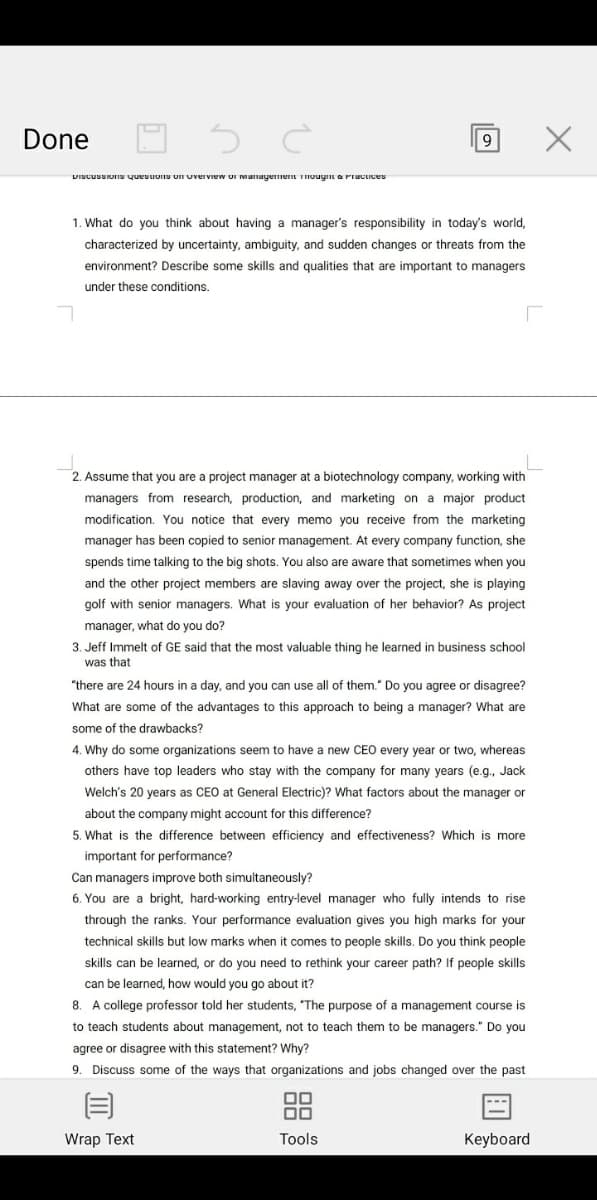What is the difference between efficiency and effectiveness? Which is more important for performance? Can managers improve both simultaneously?
What is the difference between efficiency and effectiveness? Which is more important for performance? Can managers improve both simultaneously?
Management, Loose-Leaf Version
13th Edition
ISBN:9781305969308
Author:Richard L. Daft
Publisher:Richard L. Daft
Chapter2: The Evolution Of Management Thinking
Section: Chapter Questions
Problem 1SGB
Related questions
Question
100%
What is the difference between efficiency and effectiveness? Which is more important for performance?
Can managers improve both simultaneously?

Transcribed Image Text:Done
DISCUSSIUS quesuons UI uverview uI ManayemeIL TIougnt a PruCIces
1. What do you think about having a manager's responsibility in today's world,
characterized by uncertainty, ambiguity, and sudden changes or threats from the
environment? Describe some skills and qualities that are important to managers
under these conditions.
2. Assume that you are a project manager at a biotechnology company, working with
managers from research, production, and marketing on a major product
modification. You notice that every memo you receive from the marketing
manager has been copied to senior management. At every company function, she
spends time talking to the big shots. You also are aware that sometimes when you
and the other project members are slaving away over the project, she is playing
golf with senior managers. What is your evaluation of her behavior? As project
manager, what do you do?
3. Jeff Immelt of GE said that the most valuable thing he learned in business school
was that
"there are 24 hours in a day, and you can use all of them." Do you agree or disagree?
What are some of the advantages to this approach to being a manager? What are
some of the drawbacks?
4. Why do some organizations seem to have a new CEO every year or two, whereas
others have top leaders who stay with the company for many years (e.g., Jack
Welch's 20 years as CEO at General Electric)? What factors about the manager or
about the company might account for this difference?
5. What is the difference between efficiency and effectiveness? Which is more
important for performance?
Can managers improve both simultaneously?
6. You are a bright, hard-working entry-level manager who fully intends to rise
through the ranks. Your performance evaluation gives you high marks for your
technical skills but low marks when it comes to people skills. Do you think people
skills can be learned, or do you need to rethink your career path? If people skills
can be learned, how would you go about it?
8. A college professor told her students, "The purpose of a management course is
to teach students about management, not to teach them to be managers." Do you
agree or disagree with this statement? Why?
9. Discuss some of the ways that organizations and jobs changed over the past
品
Wrap Text
Tools
Keyboard
Expert Solution
This question has been solved!
Explore an expertly crafted, step-by-step solution for a thorough understanding of key concepts.
This is a popular solution!
Trending now
This is a popular solution!
Step by step
Solved in 2 steps

Knowledge Booster
Learn more about
Need a deep-dive on the concept behind this application? Look no further. Learn more about this topic, management and related others by exploring similar questions and additional content below.Recommended textbooks for you

Management, Loose-Leaf Version
Management
ISBN:
9781305969308
Author:
Richard L. Daft
Publisher:
South-Western College Pub

Management, Loose-Leaf Version
Management
ISBN:
9781305969308
Author:
Richard L. Daft
Publisher:
South-Western College Pub